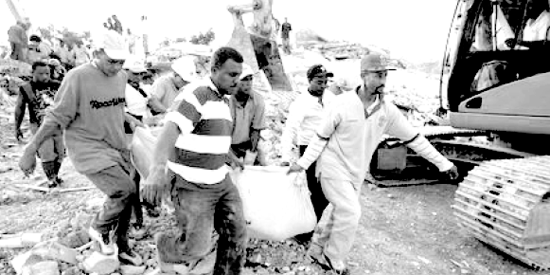
Soodeep Panta is a major in the Nepalese Army working under the United Nations, who was working in Haiti when the dreadful earthquake hit the country and took more than 70,000 lives.
“Escape from Haiti…Right now me and [B.] are in Dominican Republic Airport waiting for our flight to New York. Managed to cross the border with the help of [Captain S.]. From there got a vehicle from European Union and they dropped us at Santa Domingo around mid night. From Santa Domingo, took a cab to airport. Wi-Fi is working here in airport but very slow,” posted Mr. Panta on his Facebook wall only 3 days after the incident, unconsciously demonstrates the crucial role of the Dominican Republic in providing aid to Haiti.
According to CNN, the Dominican Republic was the first country to give aid to Haiti in the aftermath of Tuesday’s devastating earthquake. It seems like, departing from this case, there is a reconciling role of natural disasters between countries/nations. The Dominican-Haitian relations were never a perfect neighbor model for the international community, but it seems in the face of tragedy, old quarrels are forgotten.
The Dominican Republic gained its independence from Haiti in 1844, after Haiti had occupied it. The Dominicans spent the next 20 years fighting off Haitian invasion attempts.By the early 20th century, Haitians had become a source of cheap labor in the neighboring country. Racism and security concerns resulted in a massacre in 1937. Dominican leader Rafael Trujillo ordered the execution of Haitians living near the border between the countries, resulting in the killings of 20,000 to 30,000 Haitians, historians say.
On the other hand, the Haiti earthquake is not the first case when an ‘exclusive type of diplomacy’ was established between two nations: In 1999, when two subsequent earthquakes hit Turkey and Greece, such neighboring countries were also the first ones to treat each other’s wounds, which led to a ‘détente’ in the two countries’ relations after a century.
Or, remembering The Red River Floods in 1997 and the Ice Storm of 1998 which also demonstrates how Canada and the U.S. can work together, both problems and successes. These countries are not quite diplomatic enemies–at least, not too often–but lessons could be learned on cross-border disaster management for nations with more diplomatic problems.
Such incidents already caused the birth of a discipline called ‘disaster diplomacy’, which investigates how and why disaster-related activities do and do not induce cooperation amongst enemies, as the Norway-based website indicated. (www.disasterdiplomacy.org) Nevertheless, these ‘disaster diplomacy’ experts hardly suggest that such disasters are the absolute cure for neighbor conflicts. “While disaster-related activities do not create fresh diplomatic opportunities, they have the possibility of catalyzing action, although that possibility is not always fulfilled,” experts said.
In overall, the ‘disaster diplomacy’, if not a remedy, can help re-create ties between conflicting countries. And maybe more plausible, it can make us aware that the neighbor in conflict is also a human being.
“I’m a Dominican living in Santo Domingo. Yes it’s true there are mix feelings between the two nations, but the Haitians situation is critical,” a guest posted into CNN website. “By being simply ‘human’ you get affected by it, you put yourself in their place. When that happens so close to you, you feel their pain in a deeper ‘reality’ level.”
Unfortunately, still in most of the cases, there is no way to have this ‘human’ awareness without a catastrophic tragedy experience.
Interview with Rezarta Bilali, PhD.
Rezarta Bilali is an assistant professor in Dispute Resolution department at UMass Boston, with specialization on social psychology and reconciliation.- Departing from the Turco-Greek and Dominico-Haitian case, can we mention of a reconciling role of natural disasters between conflicting countries/nations?I would not say that natural disasters have a reconciliatory role, however, what they might do is to create conditions in which intergroup hostilities could be set aside and people can recognize the shared humanity and vulnerability.- What are the reasons that attribute such a role to natural disasters? One important element of intergroup conflict is the distinction between “us” and “them”. People feel closer to and are more likely to help members of their own groups. However, natural disasters might make salient an inclusive human category over national or ethnic groupings. In this sense, natural disasters might expand the boundaries of one’s group to include members of previously hostile groups, which in turn would lead to more positive attitudes, less prejudice and more intergroup helping.Additionally, under conditions of natural and humanitarian disaster, leaders have the chance to show good will, extend help, and start building trust and good rapport with each other – such efforts are more difficult to launch under normal circumstances particularly when groups or countries have a history of hostile relations. Such efforts should be genuine, sincere, and should be followed by other reconciliatory actions and initiatives.- Is such “disaster factor” sufficient per se for a reconciliation? Or is it rather a catalyst? What should be done in the post-disaster period for a permanent reconciliation?A natural disaster is not a remedy for broken intergroup relations. Indeed, some research has also shown that, even in contexts of natural disasters (e.g., Hurricane Katrina), people are less likely to empathize with or to help members of another group as compared to ingroup members. Furthermore, some people might even blame the victims for the natural disaster especially when the victimized group is already dehumanized or viewed in a negative light. One example of such victim blaming in the context of the Haitian earthquake is Pat Robertson’s statement that Haitians “made a pact with the devil”, implying that Haitians brought the earthquake on themselves. Similar examples of victim blaming are well documented in other contexts, particularly in cases of domestic abuse or rape. Victim blaming arises from the belief that the world is a just place and that bad things happen to bad people, as such it further dehumanizes the victim.
